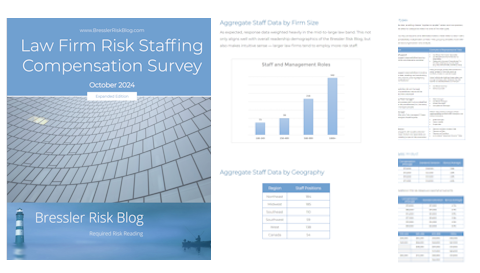Risk News — Audit Conflict Called, Investor Judge Draws Conflicts Concern, Floated Political Pick Provokes Problematic Pondering
Posted on
“Breaking News: Conflict of Interest Bombshell: Judge Invested in Ozy’s Victim Companies” —
- “Ozy Media founder Carlos Watson may not be going to prison after all. The federal judge who presided over his trial for securities and wire fraud conspiracy and identity theft and who scheduled Watson’s sentencing in December, may have to remove himself from the case for an unprecedented appearance of a conflict of interest.”
- “Watson, 55, who was convicted on all three financial fraud counts, faces a maximum sentence of 37 years, with federal sentencing guidelines ranging from 24 to 29 years, according to prosecutors.”
- “Watson’s attorney, Andrew J. Frisch, a former federal prosecutor, in a motion filed in federal court on Friday, made the shocking allegation that Judge Eric R. Komitee had significant investments through hedge funds in all three of Watson’s primary alleged corporate victims – Goldman Sachs, J P Morgan Chase, and Google.”
- “Watson’s motion demands Judge Komitee disqualify himself, vacate the conviction, and dismiss the original indictment against Watson.”
Jury Conviction and Unreported Financial Conflicts” - “In July, a Brooklyn jury convicted Watson for conspiring to defraud Goldman Sachs and JP Morgan Chase by falsely claiming Google and Live Nation were his Ozy Media company sponsors.”
- “Through four hedge funds managed by three asset management companies, Judge Komitee had active investments in all four of these Watson’s alleged victim companies, something the judge did not disclose during the trial.”
- “Komitee, one of, if not the wealthiest federal judges in America, has millions invested in hedge funds, which invest in Watson-victims Google, JP Morgan, and Goldman Sachs and other companies.Komitee began investing in the Watson victims’ stock through hedge funds before becoming a judge in 2018, during the time he worked as general counsel for Viking, one of the largest hedge funds in the world.”
- “It was not until after the trial – on October 2, 2024 – when Judge Komitee’s required annual financial disclosure for 2023 became available to the public. This prompted scrutiny into motives for what Watson’s trial attorney, Ronald Sullivan, called the most biased judge and unfair trial he had ever witnessed in more than 30 years of trial practice and decades as a Harvard law professor.”
- “The 2023 financial disclosure reveals that Judge Komitee, through hedge fund accounts worth more than $16 million, had money invested in the companies singled out by the US Attorney for the EDNY as Watson’s primary victims.”
“Conflict or Earned? Judge in Trump Cases Floated as Potential AG Pick” —
- “Donald Trump is considering U.S. District Judge for the Southern District of Florida Aileen Cannon as a nominee for the nation’s top prosecutor, according to numerous reports.”
- “ABC News first reported the former president, currently running for re-election, had named Cannon to a list of potential nominees for Attorney General, if he wins the election on Nov. 5.”
- “The news has sparked debate in the legal community for a number of reasons.On one hand, some say Trump recognized Cannon’s skillset when he appointed her to the bench long before she ever presided over any cases directly involving him. But on the other hand, some court watchers say awarding Cannon the top job would seem like a reward for her adjudication in Trump’s favor.”
- “In July, Cannon ruled that Trump’s federal classified documents trial be dismissed. She found Special Counsel Jack Smith’s ‘appointment violates the Appointments Clause of the United States Constitution.’ Smith is appealing that ruling.Cannon is also presiding over the case against Ryan Wesley Routh, the man accused of trying to assassinate Trump at a golf course in Florida. Court records suggest the judge was randomly selected for that case.”
- “But the question for some lawyers is whether the judge has a conflict—and if the reports of her consideration for a top job under a potential Trump presidency are true.”
- “Miami attorney Etan Mark of Mark Migdal & Hayden has a different take. ‘There’s something icky about a presidential candidate floating a promotion to a federal judge— in front of whom he was being prosecuted—if he succeeds in his reelection campaign,’ Mark said. ‘Presumably, Judge Cannon has the integrity to ignore these flirtations. Otherwise, if the rumors are true, she should recuse herself from any pending cases involving the former President.'”
- “Trump’s team has not publicly commented on the ABC News reports.”
“Interpath chair to step down over Deloitte ‘audit conflict’” —
- “A former chair of one of Britain’s biggest auditors is to step down as chairman of Interpath, the independent advisory firm, because of a potential conflict of interest involving its private equity backer’s choice of auditor.”
- “Sky News has learnt that Interpath, which has been engaged by billionaire Sir Jim Ratcliffe on his cost-cutting campaign since taking a stake in Manchester United Football Club, will announce this week that John Connolly is to leave.”
- “Mr Connolly, who has chaired the company since it was formed in 2021, is to hand the reins to Tamara Box, a former managing partner at the City law firm Reed Smith.”
- “Insiders said this weekend that Mr Connolly was stepping down because of the impending appointment of Deloitte as the global auditor of HIG Europe, Interpath’s private equity backer.”
- “Mr Connolly retired as senior partner and UK chief executive of Deloitte in 2011, but continues to receive a pension from the firm.”
- “One source said that he, Interpath and HIG had agreed that his departure would avoid any potential conflict of interest arising, and that HIG needed Deloitte to be conflict-free.”
- “The move is not without irony, given that Interpath’s formation was triggered by KPMG UK’s disposal of its restructuring arm amid growing obstacles posed by conflicts between large accountants’ audit and consulting operations.”





 Now in its third year, the 2024 Law Firm Risk Staffing Compensation Survey report is fresh off the presses! (And also on file with the US Copyright Office.)
Now in its third year, the 2024 Law Firm Risk Staffing Compensation Survey report is fresh off the presses! (And also on file with the US Copyright Office.) 


